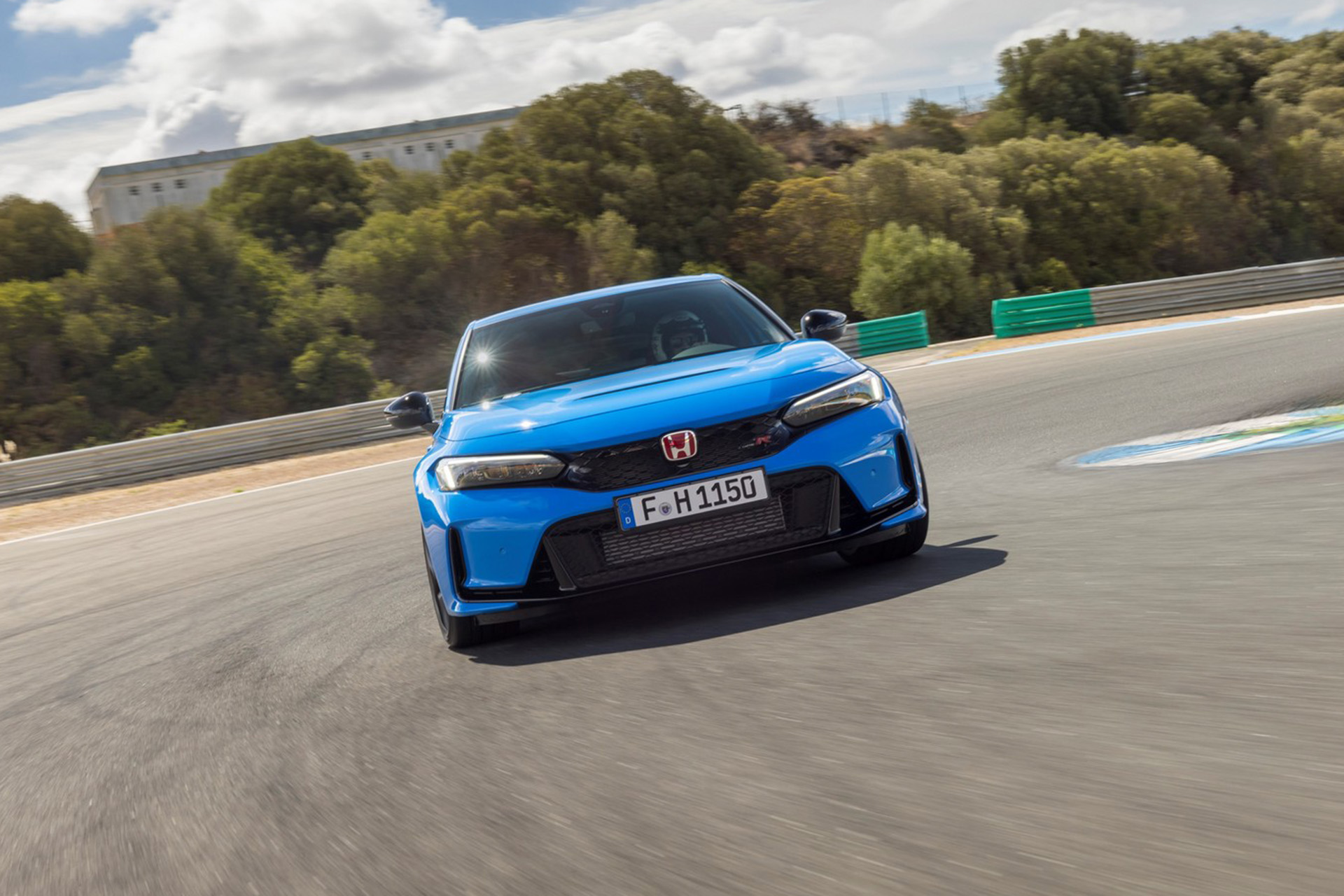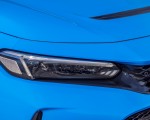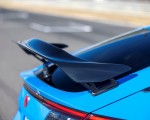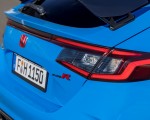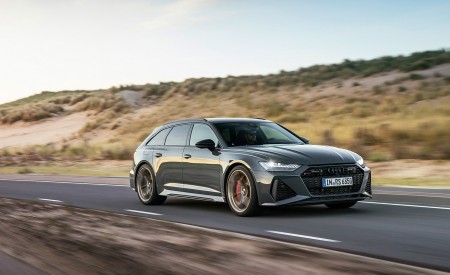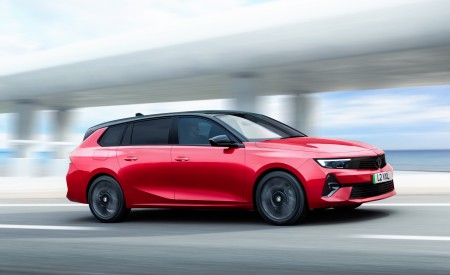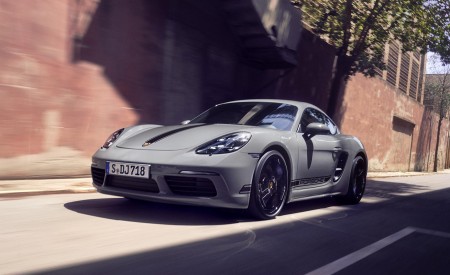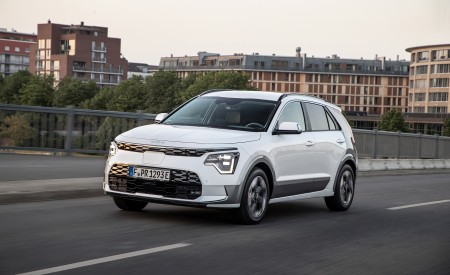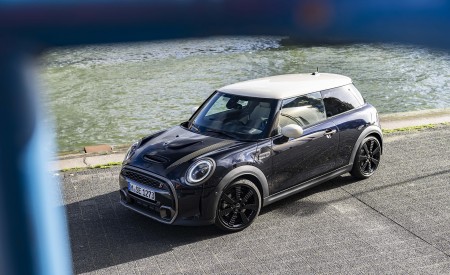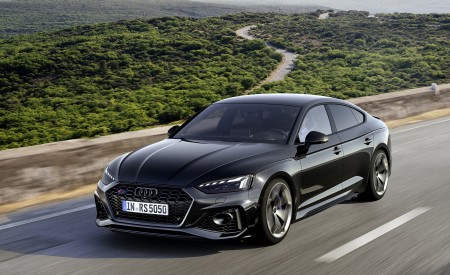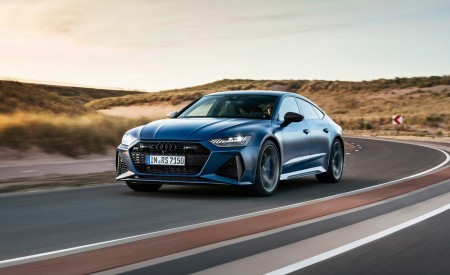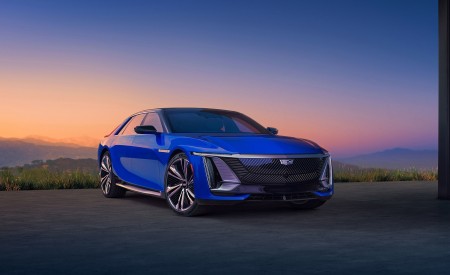2023 Honda Civic Type R (EU-Spec)
- New Civic Type R builds on 25 years of ultimate hot hatch performance.
- Performance-focused upgrades deliver the ultimate Type R driving experience.
- Latest generation recently set new front-wheel drive lap record at Suzuka.
- Available to customers in Europe from early 2023.
The launch of the all-new Civic Type R comes as Honda celebrates 25 years of its iconic high-performance hatchback – and 50 years of Civic. The next-generation model has been engineered to deliver the fastest Civic Type R to date, building on a long tradition of performance cars inspired by the spirit of racing.
Building on the human-centred approach to dynamics, design and usability applied when developing the 11th generation Civic, Honda engineers have refined every aspect to create the Honda Civic Type R. Integrated design enhancements including a functional hood vent and a new rear diffuser that bring new aerodynamic benefits, whilst complementing the sporty silhouette. The Type R is also lower and wider than the standard Civic, with a new rear spoiler design accentuating the sleek roofline and contributing to the car’s aerodynamic performance and muscular appearance.
Lightweight components and an increase in power from the 2.0 litre four-cylinder petrol engine combine to create one of the highest power-to-weight ratio in its class. A revised rev-match system with auto blip ensures that gear changes with the six-speed manual transmission offer drivers a rewarding experience.
Inside, the Type R features the evocative red interior, lightweight sport seats and driver-focused controls that distinguish all performance Hondas. In addition to pre-set driver modes, a new Individual mode enables new levels of customisation for drivers, enabling them to personalise vehicle characteristics such as throttle response and steering feedback. The onboard Honda Log R datalogger has improved monitoring and an innovative scoring function to help drivers improve their performance on the track.
As with all Honda Type R models, the Civic Type R wears the brand’s iconic crimson red ‘H’ badge that is inspired by the spirit of Honda racing. This stretches back to 1965 with the success of the RA272 Formula 1™ car at the Mexican Grand Prix, which sported white livery with a red rising sun on the nose. Honda continues to push the boundaries of performance in motorsport, with the latest generation Type R recently setting a new lap record for a front-wheel drive car at the world-famous Suzuka Circuit in Japan.
Powerful aerodynamic exterior design
Developed under the model concept of creating the “Ultimate Sports 2.0″, all aspects of the new Civic Type R have been reengineered to heighten the sense of driving exhilaration by improving aerodynamic performance and increasing downforce. Building on the sleek and stylish lines of the all-new Honda Civic, the Type R presents a more aggressive stance and greater road presence, which perfectly illustrates the vehicle’s fast, dynamic, and addictive nature.
The Honda Civic Type R is 8mm lower and 90mm wider than the Civic e:HEV, and 13mm lower and 15mm wider than the previous generation Civic Type R. The low, muscular appearance is achieved through sculpted, muscular wheel arches that flare out over new reverse rim, lightweight and high rigidity 19-inch matte black alloy wheels. These unique Type R wheels are fitted with bespoke compound 265/30R/19 Michelin Pilot Sport 4S tyres all round.
The taught surfacing of the new car is all functional. Developed by exchanging technical information and ideas with select partners from Honda’s global network of racing suppliers – including WTCR supplier J.A.S. Motorsport and Super GT engineers from HRD’s Sakura facility – the engineers focused on using Computational Fluid Dynamics (CFD) to significantly reduce air resistance around the car. The result is a marked improvement in drag coefficient over the previous generation Civic Type R, more controlled airflow, and reduced pressure changes over and around the car.
Detail touches such as the front fenders, which feature a large duct behind the wheel, help reduce pressure within the wheelhouse. The escaping airflow from these ducts is guided down the length of the car and side sill, before being directed away from the rear wheel housing and overhang by the small spoiler at the end of the sill.
Working in conjunction with these elements are the wider rear arches – now fully integrated into the body for a smoother, cleaner finish that does not impact the rearward airflow. The arch shaping removes the previous generation’s pressure fluctuations around the rear door and presents the rear diffuser and spoiler with a cleaner flow of air.
The uncluttered, noiseless front bumper is an exaggeration of the Civic e:HEV’s basic design and shape. The lower grille has been extended in width and height to accommodate the large capacity intercooler, increasing airflow to both it and the front brakes. This aperture is 10% larger than the previous generation, resulting in Type R losing the Civic e:HEV’s foglight and surrounds – replacing them with stylised, thin vertical air intakes that help emphasis the width of the car and feed air to the front brakes.
To aid thermal management of the 2.0-litre VTEC Turbo engine, the aluminium hood now features a vent, which also works in conjunction with the large lower grille to optimise airflow and provide genuine negative lift over the front end.
At the rear, the new diffuser design works in combination with the new spoiler to further increase downforce while helping to suppress air resistance. Mounted to new aluminium die cast supports, the rear spoiler is wider and lower than on the previous model, helping accentuate the sleek new roof line. The positioning of the main beam of the spoiler has been optimised by rotating past horizontal, increasing generated downforce and reducing overall drag. Mounted part way up the resin boot-lid, the positioning of the wing also improves visibility from the car, as it aligns with the edge of the rear window.
The design of the lightweight 19-inch alloy wheels is also optimised to maximise the performance of the 265/30R19 profile Michelin tyres. A design evolution of the forged items fitted to the run-out Limited Edition model of the previous generation, the new wheels feature a stepless reverse rim design to improve rigidity. Their design improves handling by stabilizing contact pressure of the inner shoulder of the tyre when cornering. Visually, this also helps create the appearance of a larger diameter wheel.
All functional parts of the vehicle are finished in a high-gloss black, including the front grille, rear diffuser and central part of the rear spoiler, accentuating the performance focus of the car. The range of available paint colours honours the car’s racing heritage, including the iconic Championship White in addition to Rallye Red metallic, and Racing Blue, Crystal Black and Sonic Grey Pearls.
A driver-focused cockpit experience
The interior of the new Honda Civic Type R is dedicated to enhancing the excitement of driving, from the moment the driver opens the door. Despite its track-focused character, the new Civic Type R maintains the high level of comfort, practicality and everyday usability that is the hallmark of the standard Civic.
The driver is positioned 8mm lower than in the previous Civic Type R and the latest 11th generation Civic, enhancing the sportscar feel. Newly designed lightweight front sports seats securely hold the driver at the waist, to support their postural structure and ensure comfort and manoeuvrability whether driving on the limit on track, or during longer drives on road. This enables the driver to easily find a natural driving position and provides a sensation of being directly connected to the car when cornering at speed.
With a reduced hip-point from ground, the body-hugging seats are central to an immersive cockpit experience. The entire cabin has been designed to enable high levels of concentration from the driver during intense driving experiences. All essential controls are placed within easy reach, with the main information display positioned as centrally as possible to allow the driver to maintain focus on the road.
Despite the low driving position, visibility from the driver’s seat is improved over the previous Type R. There are clear sight lines to the front corners of the bonnet, while blind spots have been minimised around the base of the A-pillars and side mirrors; helping drivers on both circuit and street. To minimise distraction, reflective elements in the driver’s eyeline have been reduced. In addition to the improved rearward visibility afforded by the new rear wing design, the flat shoulder line of the car enables a more intuitive perception of the car’s surroundings when using the wing mirrors.
The sense of drama is elevated by the iconic red trim that has adorned many extreme Honda machines in the past. The seats are finished in a new, more vivid high-grip suede-like upholstery at the front, whilst the rears are now finished in the same material but in a contrasting black finish with red stitching offering all occupants improved levels of support during high-speed driving. The interior carpet trim is now finished in matching red, stirring emotions of previous Type R models.
As with all of those generations, the new car also features a unique serial plate. This is now positioned on the dash, rather than the centre console of previous models, to highlight the exclusivity of the Type R experience. High-end finishing touches now adorn the cabin such as the genuine aluminium console and polarised gun metal air vent outlet surround, which not only add to the premium feel but also actively help reduce reflections.
The standard car’s all-digital meter display has also been enhanced for Type R, retaining the clean, simple dual-meter display for Comfort and Sport drive modes. Switching to +R mode engages a bespoke graphic set, which relays just the key information for focused, track driving. The full-width digital rev-counter sits atop displays of circuit driving data including vital temperatures, a lap timer and g-force meter. The newly introduced Individual mode allows users to tailor their preferred display layout.
Engineering the ultimate Civic Type R
The all-new Honda Civic Type R follows a long line of iconic Type R models that have each raised the bar for front-wheel-drive sports car performance. Building on the capabilities of the previous model, the latest generation model incorporates new lightweight materials, increased engine performance and improved driving dynamics, resulting in the fastest, most dynamic and addictive Civic Type R yet.
The most powerful VTEC Turbo ever
Since the first generation launched in 1997, the Civic Type R has become renowned for its powerful, highly responsive, and high revving engines. The latest iteration continues this dedication to performance excellence that has made the Civic Type R so popular with driving purists for 25 years.
The new Honda Civic Type R is powered by a revised 2.0 litre VTEC four-cylinder turbocharged engine, which features the application of several motorsport-derived technologies. These further improve the output, torque and response beyond the capabilities of even the lightweight Limited Edition version of the previous model.
The development team have redesigned the turbocharger to improve its efficiency. By reducing the number of turbo blades and optimising their shape and diameter, inertia within the unit has been reduced. A redesigned housing shape is smaller and more compact than its predecessor and further contributes to the higher output and responsiveness of the turbocharger.
A straight exhaust system increases the exhaust airflow rate by 13% over the previous model, reducing back pressure and allowing the engine to perform more efficiently. The system is finished with a newly designed triple-exit backbox that has an active valve to further increase exhaust gas flow. Enhancements to the sound modulation also improve the aural sensation to increase driver engagement.
The new car features enhanced temperature control and air-cooling through an upgraded radiator, ensuring sustained, optimal performance during heavy use thanks to the 48% larger opening offered by the new grille and front bumper design. A revised air intake is larger in diameter allowing for a 10% increase in intake flow rate.
All of this is managed by a revised engine control system, which has been updated by further increasing the resolution of the ignition timing control and tuning of the VTC (Variable Timing Control), to improve overall throttle response under acceleration.
The overall effect of the engine upgrades is higher performance at high revs and lower fuel consumption at low revs, and the highest power-to-weight ratio in its class. The engine produces 329PS @ 6,500rpm, whilst 420 Nm is available at just 2,200 rpm, and remains available up to 4,000 rpm, with the engine revving freely all the way to 7,000 rpm. The result is the Civic Type R can sprint from 0 – 100 km/h in just 5.4 seconds, and on to a top speed of 275 km/h.
Helping achieve these figures is a revised six-speed manual transmission, that has a number of new features designed exclusively for the new Type R which significantly improves the smoothness and shifting load. A new lightweight flywheel is 18% lighter than the previous generations, reducing inertia by 25% helping the VTEC Turbo be even more responsive.
A revised rev-match system with auto blip ensures perfectly paired rev-matching when shifting down through the gears, helping balance the car on corner entry. Particular attention has been paid to the 2nd to 1st gear shift. The high-strength gearbox has also gained a high-rigidity lever, an optimised shift gate pattern as well as a unique to Type R shift link mechanism to improve shift smoothness. Feel has also been improved with an optimised spring rate for faster gear changes with more satisfying weighting.
Despite being the most powerful Civic Type R ever, Honda engineers have improved the emissions output and fuel efficiency of the vehicle. The result of the extensive technological advancements is just 186 g/km of CO2 emissions, with fuel economy of 8.2 l/100kms (WLTP).
Lightweight, rigid chassis tuned for addictive performance
The latest generation Civic has been engineered to ensure that its chassis, steering, and suspension deliver superior levels of performance, dynamic response, and feedback in all driving situations. It was developed with a particular focus on precise steering feedback and a more planted ride, to increase the driver’s sense of connection with the car – an effect that is heightened in the all-new Type R.
The 35mm longer wheelbase, compared to the previous Type R, and multilink rear suspension of the base car are paired with a significantly wider rear track to offer improved cornering stability over its predecessor. This has been refined through repeated testing on both the Autobahn and the Nürburgring.
The dual-axis front suspension, a configuration to minimise torque steer, has been revised with new lower suspension arms optimised in shape and rigidity to achieve a 16% increase in camber rigidity over the previous generation Type R. The front also features millimetre revised geometry to accommodate for the 265/30R19 Michelin Pilot Sport 4S tyres and increased engine torque.
The adaptive dampers have been retained from the previous generation but feature a revised control logic for roll and pitch control.
A 15% increase in rear body rigidity over the previous Civic model further improves stability when cornering. To help realise the stiffer body, Honda has significantly increased the application of structural adhesive throughout the chassis. 3.8 times the amount of adhesive has been used in comparison to the previous Type R, with engineers applying the coating around key areas such as the bulkhead, door apertures and rear suspension turrets.
The increased application of structural adhesive is symbolic of the weight optimisation the Civic development team also focused on. The aluminium bonnet of the new Civic is 43% lighter than the previous model’s steel panel, while the resin tailgate is 20% lighter than before. The strategic use of lighter materials, combined with structural improvements, has resulted in a lightweight yet highly rigid body.
Stopping power is provided by an upgraded Brembo braking system featuring revised brake ducts and a new mechanical brake master cylinder. These provide better temperature control while ensuring improved controllability and enduring stopping power, whilst the two-part floating discs are retained from the previous generation for sustained high level braking performance.
Addictive steering feel
When developing the Type R’s steering, engineers wanted to encourage smooth driving, with minimal corrective inputs required from the driver. This has been achieved through a number of revisions to core hardware. The steering column now features bearings that have gone through a honing process for improved rigidity and longevity, the tie-rod ends are now also made from a high-rigidity material for increased steering feel, and the sliding section of the intermediate shaft now features serrations for more defined engagement.
Thanks to the application of a revised EPS control logic, a larger diameter, 60% more rigid, torsion bar could now be applied to the column, as well as high-rigidity tie rods, to reduce unwanted steering deflections, in order to decrease steering input delay for outstanding feedback and response.
The Motor Control Unit (MCU) has been carried over from the Civic e:HEV but with a revised control logic. This has improved on centre response and off-centre stability for a more responsive, yet linear feel throughout the steering range.
Bespoke Michelin tyres
In order to raise the handling limit of high-performance, front-engine, front wheel drive cars, Honda and Michelin codeveloped a bespoke compound tyre to cope with the heavy burdens placed on the front axle during performance driving.
The key was to ensure that the tire performance was stable in the high load range, and could control the load transfer characteristics of the Type R. After expanding the tire width to 265, different compounds were trialled and combined for each tread block.
Michelin’s proprietary C3M manufacturing method has achieved a significant improvement in dry grip without compromising wet performance or wear performance.
Internally, the tyre features a ‘wavy’ belt structure to match the block shape of the tyre, offering increased support to the moveable tread blocks by reducing the distance between the belt to the tire’s contact patch with tarmac.
Structural safety
The Civic Type R also benefits from new structural components developed for the standard Civic, to improve front, rear and side collision protection, enhancing overall passive safety.
Since the previous generation, Honda has implemented a network of interconnected structures to increase both torsional and bending rigidity. At the front of the car, a strong ring-shaped framework creates a more efficient joint structure for the front bulkhead. This is mirrored at the rear, with a second ring-shaped bulkhead bracing the tail end of the car. Connecting these is a highly rigid grid frame structure along the floor, which is paired with a butt-jointed centre tunnel. In addition to the improved dynamic behaviour of the car, the stiffer shell also provides improved refinement with reduced NVH transfer to the cabin, and improved safety with greater resistance to floor deformation in the event of a collision.
New developments for this generation Civic include additional front door stiffeners and rear wheel arch frames that improve side impact performance, and front bumper beam safety plates that absorb impact energy to reduce the risk of leg injury for pedestrians in the event of a collision.
The new Honda Civic Type R incorporates 8 airbags inside, including new knee airbags for both front seats to reduce occupant injury during front impacts and side airbags to help protect passengers in the rear seats.
Safety technology
The all-new Civic Type R benefits from the advanced suite of class-leading safety features, including the latest Honda SENSING enhancements, introduced in the standard Civic. The latest safety features mark the next step in Honda’s bold ambition to bring traffic collision fatalities involving Honda automobiles and motorcycles to zero by 2050.
The sonar sensors that first debuted in the all-new Civic, four at the front and four at the rear, use the reflection of sound waves to detect non-metallic objects such as glass and walls. The front camera provides a 100-degree view and enables enhanced recognition technology to improve the car’s capability to identify road lines, verges, motorcycles, and cyclists.
A high-speed processing chip has been used to improve the detection, performance, and control of the system, meaning the Honda SENSING system can detect objects earlier and more accurately than conventional millimetre radar systems, including pedestrians in light and dark environments.
The Honda SENSING suite of active safety technologies includes:
- Forward Collision Warning System
- Collision Mitigation Braking System (CMBS)
- Cross Traffic Monitor
- Blind Spot Information System
- Lane Keeping Assist System (LKAS)
- Road Departure Mitigation System
- Adaptive Cruise Control (ACC)
- Traffic Sign Recognition
- Automatic High Beam
Honda Log R 2.0: Performance data in real-time
When developing the new Civic Type R, Honda engineers set out to provide drivers with a wealth of data, presented in an easy to interpret way, to ultimately help improve and refine driving skills on both road and track. This has taken the form of the new Honda Log R 2.0 app.
Heavily revised for this generation Type R, the app is now built into the infotainment system and no longer requires hosting via a hardwired smartphone, offering users an improved and more stable connection. The app also features a number of improved screens and graphical readouts, for both the smartphone screen and the data relayed through the new infotainment touchscreen.
Enabling all of this is a powerful data analysis system, which uses multiple datum points captured through the car’s internal sensors. This allows the Honda Log R 2.0 app to provide users with two in-depth features; a ‘Performance Monitor’ function and a ‘Scoring’ function.
In Performance Monitor, 12 separate items of vehicle information can be selected from and relayed to the driver including engine, water, and oil temperatures as well as steering angle, brake pressure, accelerator pedal angle and yaw rate. The display also shows driver’s operation and how the vehicle behaved.
One of the new functions introduced to Honda Log R 2.0 is a digital tyre friction circle, which calculates and displays the maximum tyre friction force of each of the four tyres that can exert at the moment, as well as the value of both longitudinal and lateral magnitude of the actual tyre force being used as a vector. This is calculated from the vehicle acceleration and tyre load information and displays in real time on the display monitor.
The Scoring function allows users to review their driving to help improve skills behind the wheel. This function is capable of delivering two further functions; Auto Score and Data Log. Auto Score function evaluates driving performance on the public road in everyday situations, whilst Data Log function allows owners to record and analyse track driving data.
The Auto Score function operates whenever the Honda LogR 2.0 app is running, tracking and logging inputs in five key performance areas: acceleration, deceleration, turning, straight-line driving and combination. A score for each of the inputs is generated by benchmarking the user’s driving against the Honda R&D database-derived algorithm built into the app, helping to determine where improvements can be made. Drivers can also delve into previous journeys to assess how their driving style has improved over time. This mode is designed to encourage efficiency and smoothness improvements in routine daily driving.
In Data Log mode, acceleration, braking and cornering G forces data is collected and combined with GPS location mapping to provide a comprehensive lap overview. The colour coded lap trace allows users to recognise, and improve on, their braking points and throttle position at all points of the circuit. The GPS locator can also be used to set start and finish line markers for timed laps, with all data saved for comparison with previous and future laps.
Feedback is offered through an innovative scoring system as a part of Data Log function, which helps drivers pinpoint where they can improve their skills. The unique scoring function within Data Log mode awards up to 100 performance-based points per lap. The system follows the same C, B, A, S, and S+ driver ranks as Honda’s R&D evaluators, offering easy to interpret data inspired by professional motorsport coaching for continual on-track improvement.
To further help drivers get more of Type R performance on track, other features built into Honda Log R 2.0 include a stopwatch to record and log lap times. ‘VS Mode’ also allows drivers to compare and contrast a multitude of parameters and track records by enabling the Data Log function.
Using the Auto Score and Data Log functions, driving data stored in the vehicle’s local storage is automatically uploaded to the server and can be viewed anytime, anywhere using the Honda Log R 2.0 app installed on a smartphone. Another new feature of the Honda Log R 2.0 app is the ability to transform a smartphone’s video function into data laden onboard camera. This captures onboard footage and overlays synchronised live streams of data for a number of performance parameters. Lap count, lap time, real-time vehicle and engine speed, tyre friction, registered G forces and more are all overlaid in clear, easy to read formats.
Available to download from the App Store and Google Play, Honda Log R 2.0 can provide a multitude of take-away, in-depth analysis points for drivers to assess when they are away from the car, too.
Customisable Type R experience
To achieve the ultimate Civic Type R experience for every driver, Honda has expanded the breadth of control over the car’s performance characteristics. Accessed through a dedicated ‘drive mode’ toggle positioned next to the gearstick, users can choose from three pre-set performance settings – Comfort, Sport and Individual to alter the characteristics of the engine, steering, suspension, engine sound, rev matching and performance meter. A dedicated button for +R mode is positioned just above the toggle.
Each mode is tailored to different aspects of the car, including the adaptive dampers, steering force, rev matching and throttle response. When starting the engine, the car will begin in the mode last used as the default setting.
When in Comfort mode, the Honda Civic Type R offers greater compliance and everyday usability through a software suspension setup and smoother steering feel. This mode is ideal for rough road surfaces and prolonged motorway driving.
Sport mode offers a blend of comfort and dynamic response that increases responsiveness over Comfort mode without compromising on ride quality, sitting between Comfort and +R modes.
+R mode is the most performance-focused driver setting and remains the optimal choice for track use. This mode offers faster throttle response, and a sportier, controlled ride via the Adaptive Damper System. The result is more direct and linear power and steering feel, offering the ultimate Type R experience.
In +R mode, the Traction Control System and the Vehicle Stability Assist (VSA) system function can be completely turned off, allowing a greater yaw and slip rate. To do this, users must press the VSA button for five seconds while in +R mode.
Internally, the digital dialset switches to a bespoke Type R layout, focusing what data is relayed. Completing the +R experience is an increased engine noise augmentation, delivering a more intense driving experience.
This latest generation Type R introduces a new Individual mode, a Global debut for the Civic Type R, enabling total customisation of the driving experience.
It allows users to configure settings that best suit their needs, preferences, and local driving environment. The mode can be accessed via the rocker switch like the pre-set modes of Comfort and Sport. In this mode, users can individually configure the throttle response, steering feel, suspension, engine sound, performance metre, and rev matching systems and save their settings for future use.
HAC-E Genuine Accessories
For the all-new 2023 Civic Type R, Honda has developed a number of official accessories and accessory packs that enhance and complement the car. These range from purely cosmetic additions that accentuate the low, wide, and sporty nature of the car to practical touches that heighten the useability of the car on a daily basis.
Carbon Pack
A highly decorative yet functional pack, the carbon pack introduces a hand made, genuine all-carbon rear wing spoiler, carbon centre console panel and matching carbon door sill trims to add a further racing touch to the Type R.
Illumination Pack – Red
A combination of interior and exterior illumination items, the Illumination Pack Red contains front foot and under seat lighting, door lining illuminations as well as cup holder and console illumination to create a sporty red ambient atmosphere inside the Type R. A white/red exterior illuminated Type R pattern projector completes the set up and offers greater visibility at night.
Body Cover
Helping keep the Type R immaculate all year round is a full body cover; made from 3-layer, water-resistant yet breathable materials, the cover offers maximum protection against the elements and UV rays. The soft inner fleece lining protects paintwork and is suitable for both indoor and outdoor use. Finished with the Type R logo, the cover can be used with both the standard and optional rear wings.
Red Illuminated Door Sill Trims
The illuminated door sill trims are crafted from black brushed stainless steel and have a red illuminated Type R logo. Designed to protect the door sills from ingress and egress marks, the kit includes trims for all four door apertures.
Elegance Floor Mats
Finished in the same red as the carpet, the elegance floor mats are made from an elegant fitted, tufted carpet complete with red nubuck bindings. Designed to complement the red accents throughout Type R cabin, the front and rear red mat set is finished with a metal Type R emblem.
Carbon Wing Spoiler
Maximize the extreme look of the Type R with the optional real carbon fibre spoiler. Featuring a revised design to the standard item, the optional wing has a unique, eye-catching red weave within its construction to help personalise the car even more.
Carbon Centre Console Panel
Bringing that extreme look to the interior of the Type R is the optional carbon centre console panel, which features the same unique red weave finish to transform the cabin.
Carbon Door Sill Trims
The door sill trims are manufactured out of real hand-made carbon for increased protection when entering and exiting the car and feature the Type R logo to create a powerful impression the moment the door is opened.
Red Door Lining Illuminations
Once the ignition is turned on, the door lining becomes illuminated in a flood of soft, red light. Fitted to the door handles and pockets, the illuminations create a sporty, purposeful atmosphere within the car.
Red Front Foot and Under Seat Lights
Unlocking the doors of the Type R will illuminate the area under the front seats and complete front footwells in a sporty red light. While driving, illumination is dimmed by 50% to avoid distraction.
Red Cup Holder and Console Illumination
When turning on the ignition and headlights, the base of the front cup holders, and the storage box in the centre console illuminate in an ambient, sporty red light.
Illuminated Type R Pattern Projector
The Type R logo is projected on the ground with a bright red and white glow when opening the front doors, creating more visibility in the dark when getting in and out of the Type R.









